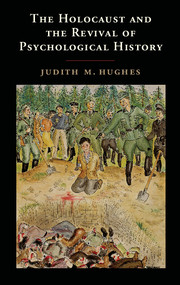Conclusion
Published online by Cambridge University Press: 18 December 2014
Summary
I said at the outset that psychological history is a matter of questions asked, a matter of wondering about actors’ meaning, intentions, and purposes – of recognizing agency. All the works I have examined cleared this initial hurdle. Not all continued on. The ones that did, the more psychologically sensitive, suggest interpretations that should figure in accounts of those complicit in genocide.
Let me begin with the authors who stopped short. Here I am pointing to Hugh Trevor-Roper, Daniel Jonah Goldhagen, Christopher R. Browning, and Hannah Arendt. Arendt is perhaps the clearest example. Eichmann, she argued, had a conscience; but it operated as one might expect only for about four weeks. Then it switched – or shut off – to a Nazi moral code. And Eichmann never glanced back. (“Except for an extraordinary diligence in looking out” for his own “advancement,” Arendt claimed, “he had no motives at all.”) Browning, for his part, found Stanley Milgram’s concept of obedience to authority appealing – and along with it the notion that “normal individuals enter an ‘agentic state’” – a state in which they hand over agency and “become the instrument of another’s will.” Even more attractive to Browning was the idea of conformity and peer pressure. That too entailed an abdication of responsibility. In later actions, in clearing out ghettos and herding Jews onto death trains, the policemen had no sense of being personally accountable, indeed, of “really participating.” Moving on to Goldhagen: despite his insistence that individuals have wills of their own, his claim that Germans – all Germans, throughout long stretches of their history – invariably incorporated eliminationist anti-Semitism transformed his subjects into automata. Animated by a delusional belief system, they went on, as a matter of course, to commit horrendous and sadistic deeds – which Goldhagen narrated in vivid detail.
- Type
- Chapter
- Information
- The Holocaust and the Revival of Psychological History , pp. 179 - 182Publisher: Cambridge University PressPrint publication year: 2014
References
- 1
- Cited by



